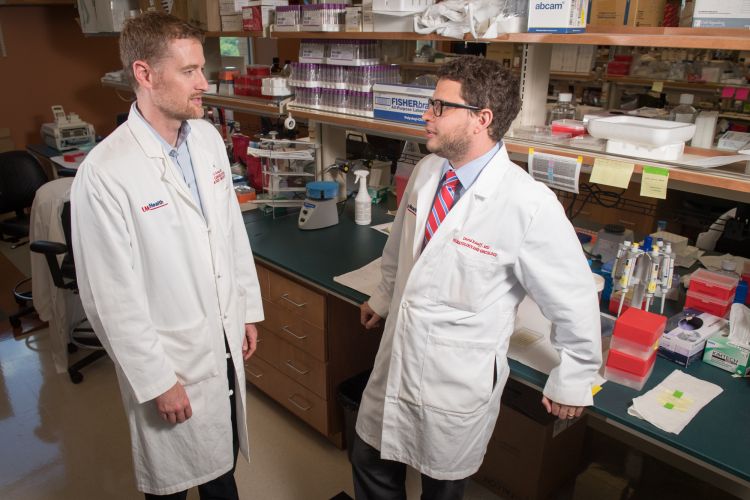Making an impact: Training the next generation of physician-scientists

Setting the foundation of a life in research paired with a life in clinical medicine poses many challenges for early-career physician-scientists. Each realm requires unique skills, knowledge, and approaches to time management and collaboration.
But for trainees in our Physician-Scientist Training Program (PSTP), this duality is an inspiration, not a barrier. And UW-Madison fosters success amidst the many inherent demands of blending discovery and clinical care. “This is really the most collegial environment in which I have worked and there are so many opportunities for learning and career advancement in all areas of interest,” said David Kosoff, MD, fellow and PSTP trainee.
This is by design, explains program director Vincent Cryns, MD, professor and head, Endocrinology, Metabolism and Diabetes and Marian A. and Rodney P. Burgenske Chair in Diabetes Research. “The PSTP provides individualized mentoring for physician-scientists from residency through fellowship to help them successfully navigate this critical period in their career development,” said Dr. Cryns. “Our goal is to ensure that each trainee receives state-of-the-art research and clinical training to enable them to launch their own independent careers as physician-scientists.”
It’s all a matter of timing, according to program leaders. Residents who enroll in the PSTP complete their residency training in two years rather than three (which is why such programs are sometimes called “short-track” residencies), leaving a full year to focus on research. Should PSTP residents desire to pursue fellowship training at UW-Madison, they are guaranteed a spot and can extend the fellowship to three years, allowing further time to continue their research.
This protected time is essential, because the pace of research and clinical care each operate under their own time zones; many scientists new to research are surprised at how long it can take to generate cutting-edge knowledge as experiments take unexpected twists and turns. Dr. Kosoff, whose research project focuses on the relationship between immune dysfunction and prostate cancer, quickly discovered that research progress required a different type of tenacity. He studies in the laboratory of Joshua Lang, MD, MS, assistant professor, Hematology, Medical Oncology and Palliative Care. "The difference between research and clinical training is so vast — I felt like I had two different lives, and I was trying to bridge them constantly. Josh helped me with this so much, because he's been there himself," said Dr. Kosoff.
Dr. Lang’s perspective was gained through his own experience as a physician-scientist, and as one of the very first graduates of the PSTP before it was known by that name. He pursued his residency and research training in short-track format along with Miriam Shelef, MD, PhD, assistant professor, Rheumatology, forming a cohort of two. For Dr. Lang, research offers an outlet to a tendency that he sees in many physician-scientists: a combination of curiosity and dissatisfaction. He explained, “Everything I hate to do with patients, we do in the lab.”
“I hate having to tell a patient that their cancer has become resistant to therapy, and we don't know why. I hate telling patients that we've run out of options for drugs to treat their particular type of cancer. These are the problems that we tackle with our research,” he said.
Clarity, focus, and collaboration
That sense of urgency bring sharp focus to translational research. It also helps shape close intellectual relationships between PSTP mentors and mentees. With time and support from the Department of Medicine (including travel funds to allow PSTP trainees to attend scientific conferences), the program has grown to include six current trainees and five alumni, and is poised to expand further.
There’s a world of possibilities for trainees, said Dr. Cryns. “One of the unique aspects of our program is that PSTP trainees can choose any lab at UW for their research training and any division in the Department of Medicine for their clinical training,” he said. Given the interconnections between researchers across the UW-Madison campus, it’s entirely possible for trainees to collaborate with investigators in disciplines ranging from chemistry to biomechanical engineering—as Dr. Kosoff discovered when working on microfluidic devices to study tumor microenvironments with David Bebee, PhD, College of Engineering.
Toward the future
As he moves toward the next phase of his career, Dr. Kosoff feels certain that his experiences have prepared him for academic medicine. While many aspects of research are ever-evolving and complicated, the guidance and experience he’s gained as an PSTP trainee have provided a steadying influence and a strong foundation. “I truly believe that UW-Madison was the best possible place for me to start my career,” he said.
Updated September 21, 2021